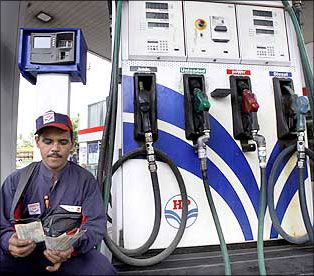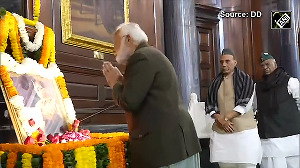Tthe real test of the government's resolve will happen as and when crude oil prices rise at a time when state elections are due.
 This week, state-owned oil marketing companies increased the prices of petrol and diesel.
This week, state-owned oil marketing companies increased the prices of petrol and diesel.
This increase, of just under two per cent, came following 10 successive cuts in petrol prices, since last August, and six of diesel, since October.
As global crude oil prices have now gone up, the oil marketing companies rightly passed on the additional burden to buyers.
In the past, fuel prices were subsidised by the government in order to cushion users from spikes in crude oil prices.
The subsidy burden was shared among the upstream oil companies, oil marketing companies and the government.
While petrol prices were deregulated in 2010, it was decided to continue with administered prices for diesel on the specious ground that it was the poor man's fuel.
In 2013, the United Progressive Alliance government decided to go for partial decontrol: while bulk users were required to pay the market price, retail prices were raised in small doses till the subsidy got totally wiped out, paving way for full decontrol of diesel prices.
The fall in crude oil prices has made it politically easy for the National Democratic Alliance government to fully remove the subsidy. But there were still doubts. Would the decontrol last only so long as crude oil prices were falling?
Would the oil marketing companies have the freedom to increase prices when crude oil became more expensive? Sunday's increase, therefore, is a welcome decision as the government's action is in line with its stated intention.
However, the real test of the government's resolve will happen as and when crude oil prices rise at a time when state elections are due, and oil marketing companies need to raise petrol and diesel prices accordingly.
At the moment, there is no such politically salient moment, so it could be argued that it is now safer to increase prices.
And it remains to be seen whether or not the oil marketing companies will have the freedom to raise prices when electoral considerations will become an important factor. Several important state elections will test this question.
Bihar is scheduled to go to the polls in November; other large states like West Bengal, Tamil Nadu and Assam will select their new legislative Assemblies in 2016. Uttar Pradesh and Punjab will follow in 2017.
Some worry that the political factor hasn't totally gone away from petrol and diesel pricing: just before the Delhi elections, the oil marketing companies had made deep cuts in prices, though crude oil prices had already begun to firm up.
Much will depend on which way crude oil prices move from here. In spite of the recent rise, most analysts say prices could soften further in the days to come as the American recovery remains tentative and the Chinese economy is showing definite signs of slowing down.
Moreover, members of the Organisation of Petroleum Exporting Countries or OPEC are expected to pump out more and more crude oil in order to maintain their market share. Some analysts have predicted that crude oil prices could even fall to $20 a barrel.
Indian oil marketing companies will have no hesitation in lowering petrol and diesel prices if this happens.
But if crude oil prices rise, as most analysts predict that they would by the end of the year, the oil marketing companies should continue to have the full freedom to increase prices as well. That is true reform.












 © 2025
© 2025